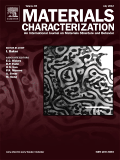
MATERIALS CHARACTERIZATION
Scope & Guideline
Innovating Characterization Techniques for Tomorrow
Introduction
Aims and Scopes
- Materials Characterization Techniques:
The journal emphasizes the use of advanced characterization techniques such as electron microscopy, X-ray diffraction, and spectroscopy to analyze material structures at micro and nanoscale levels. - Microstructure-Property Relationships:
A core focus is on understanding how microstructural features influence the mechanical, thermal, and electrical properties of materials, aiding in the design of materials with tailored properties. - Innovative Manufacturing Methods:
Research on innovative manufacturing processes such as additive manufacturing, laser processing, and advanced welding techniques is highlighted, showcasing how these methods affect material properties. - Multiscale Modeling:
The journal addresses the integration of experimental results with multiscale modeling approaches to predict material behavior under various conditions, thus enhancing the understanding of complex materials. - Environmental and Functional Properties:
It explores the environmental effects on materials, such as corrosion resistance and thermal stability, as well as functional properties relevant to applications in electronics, aerospace, and biomedical fields.
Trending and Emerging
- High-Entropy Alloys and Composites:
Research on high-entropy alloys and composites is rapidly increasing, showcasing their unique properties and potential applications in various industries, reflecting a growing interest in materials with complex compositions. - Nanomaterials and Nanostructures:
There is a notable trend towards the characterization of nanomaterials and nanostructures, driven by their applications in electronics, energy storage, and catalysis, indicating a shift in research towards nanoscale phenomena. - Additive Manufacturing Innovations:
Studies focusing on the characterization and optimization of materials produced through additive manufacturing are trending, highlighting the need for understanding the unique properties and behaviors of these materials. - In-Situ Characterization Techniques:
Emerging in-situ characterization techniques, such as real-time monitoring of microstructural evolution during processing, are gaining traction, emphasizing the importance of understanding materials under operational conditions. - Sustainability and Green Materials:
Research on sustainable materials and eco-friendly processing methods is on the rise, reflecting a broader societal push towards environmentally responsible materials science.
Declining or Waning
- Traditional Metallography:
Research related to conventional metallographic techniques appears to be waning as more advanced and sophisticated methods gain popularity, leading to a decrease in submissions focused solely on traditional methods. - Basic Mechanical Testing:
Papers solely dedicated to basic mechanical testing without a strong focus on microstructural analysis or advanced techniques are becoming less frequent, indicating a shift towards more comprehensive studies. - Static Property Assessments:
Studies that focus only on static properties of materials without considering dynamic or time-dependent behaviors are increasingly less common, as the field moves towards more holistic approaches. - Characterization of Well-Established Materials:
There seems to be a decline in studies on well-established materials such as conventional steels or alloys, as researchers are now more inclined to explore novel materials or composites.
Similar Journals

International Journal of Applied Ceramic Technology
Driving excellence in applied ceramic research.International Journal of Applied Ceramic Technology, published by WILEY, serves as a key platform for advancing the field of ceramics and composites with a rich focus on innovation and practical applications. With an ISSN of 1546-542X and E-ISSN 1744-7402, this journal has established its presence in multiple disciplines, indicated by its impressive Q3 rankings in Ceramics and Composites, Condensed Matter Physics, Marketing, and Materials Chemistry as of 2023. Covering research from 2004 to 2024, it provides a comprehensive repository of knowledge that aids in the understanding and development of materials. Although it lacks Open Access options, the journal maintains rigorous peer-review standards that ensure high-quality publications for researchers, professionals, and students alike. Given its scopus rankings, including a commendable #61 in Ceramics and Composites, this journal is pivotal for anyone looking to deepen their expertise and engage with the latest advancements in ceramic technology.
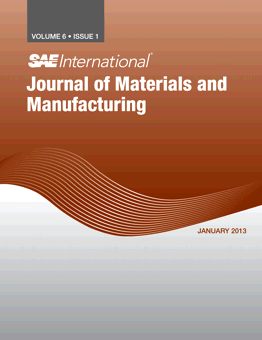
SAE International Journal of Materials and Manufacturing
Advancing the Frontiers of Materials and ManufacturingSAE International Journal of Materials and Manufacturing, published by SAE International, is a leading peer-reviewed journal that focuses on the advancements and research in the fields of materials science and manufacturing engineering. With ISSN 1946-3979 and E-ISSN 1946-3987, this journal is an essential resource for researchers, professionals, and students who are keen on exploring innovative materials and modern manufacturing techniques. Although the journal currently does not offer open access options, its rigorous selection process ensures the publication of high-quality papers that contribute significantly to the knowledge base in the industry. Recognized within the third and fourth quartiles across various engineering categories, including Industrial and Manufacturing Engineering and Mechanical Engineering, the journal provides an impactful platform for disseminating groundbreaking research. With a converged history since 2002 and a comprehensive approach to critical topics in mechanics of materials, it empowers the academic community with vital insights, trends, and methodologies that propel the future of manufacturing excellence.

Materiali in Tehnologije
Unveiling Cutting-edge Discoveries in Materials ScienceMateriali in Tehnologije is a distinguished peer-reviewed journal dedicated to the field of materials science, focusing specifically on metals and polymers. Published by the Institute for Metals and Materials Technology in Slovenia, this open-access journal has been at the forefront of disseminating research findings and innovative technologies since 2000. With a current impact factor that reflects its increasing visibility in the academic community, Materiali in Tehnologije serves as an invaluable resource for researchers, professionals, and students alike, encompassing a wide array of studies in the categories of Metals and Alloys, as well as Polymers and Plastics. The journal is indexed in Scopus, highlighting its relevance and contribution to the field, particularly with its ranks of Q3 in Metals and Alloys and Q4 in Polymers and Plastics. As it converges towards 2024, Materiali in Tehnologije continues to be a pivotal platform for knowledge exchange, encouraging advancements in materials research and technology.

Letters on Materials
Connecting researchers with groundbreaking findings in materials science.Letters on Materials, published by the Russian Academy of Sciences, Institute of Metals Superplasticity Problems, serves as a vital platform in the diverse field of materials science. Established in 2014 and running through 2024, this journal has carved a niche as a Q3 category publication, focusing on innovative research and developments in materials science and engineering. With its ISSN 2218-5046 and E-ISSN 2410-3535, it provides a unique opportunity for researchers and industry professionals to disseminate significant findings and theoretical advancements within the materials domain. While currently not categorized as open access, the journal maintains a global reach, promoting scientific dialogue and collaboration particularly within the Russian Federation and broader international audiences. Its placement within the 25th percentile in the Scopus rankings underscores its emerging significance, making it essential reading for anyone interested in cutting-edge materials research.
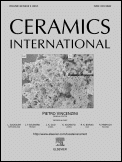
Ceramics International
Discovering the art and science of ceramics.Ceramics International is a premier journal published by ELSEVIER SCI LTD, focusing on advancing the field of materials science with a specific emphasis on ceramics and composites. With an impressive impact factor and a top-tier standing in several critical categories, including Q1 rankings in Ceramics and Composites, Electronic, Optical and Magnetic Materials, and Materials Chemistry, this journal serves as a crucial resource for researchers and professionals alike. Established in 1981, it has consistently showcased cutting-edge research in various domains, including surfaces, coatings, and process chemistry technologies, making it invaluable for those advancing theoretical and practical knowledge in these areas. While access is through subscription, the journal’s rich content, profound insights, and rigorous peer-review process ensure high-quality articles that contribute meaningfully to the scientific community. By fostering innovation and collaboration through rigorous research, Ceramics International stands out as an authoritative source for those dedicated to the evolution of materials science.
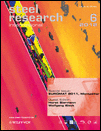
STEEL RESEARCH INTERNATIONAL
Fostering Knowledge in Material Chemistry and Metallurgy.STEEL RESEARCH INTERNATIONAL, published by WILEY-V C H VERLAG GMBH, is a premier journal that serves as a vital source of knowledge in the fields of condensed matter physics, materials chemistry, and metal and alloy research. With an ISSN of 1611-3683 and an E-ISSN of 1869-344X, this journal provides open access options that enhance its visibility and accessibility. Recognized for its scientific merit, it currently holds a Q2 ranking across multiple categories including Condensed Matter Physics and Materials Chemistry. This translates to an exceptional placement within the 64th percentile for Metals and Alloys and substantial recognition in other related fields according to Scopus rankings. By bridging theoretical concepts and practical applications, STEEL RESEARCH INTERNATIONAL aims to foster innovative research and dissemination of knowledge among researchers, professionals, and students focused on advancing the metallurgy and materials science domains. With a commitment to remain at the forefront of research from 2003 to 2024, the journal is poised to continue shaping the future of steel and alloy studies.

Materia-Rio de Janeiro
Unlocking innovative research for a sustainable future.Materia-Rio de Janeiro is a distinguished open-access journal published by UNIV FED RIO DE JANEIRO, LAB HIDROGENIO, dedicated to advancing knowledge in the fields of Chemistry, Materials Science, and Physics. Since its inception in 2006, the journal has established a platform for the dissemination of innovative research, fostering collaboration among researchers globally. The journal's commitment to open access promotes the widespread availability of valuable scientific findings, making it an essential resource for academia and industry professionals alike. With a focus on diverse disciplines, Materia-Rio de Janeiro holds a Q4 classification in multiple categories for 2023, indicating its relevance in the expansive landscape of materials research. Operating from Rio de Janeiro, Brazil, this journal serves as a vital conduit for emerging scientific insights, hence delivering impactful contributions to the global research community.
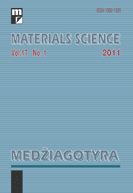
Materials Science-Medziagotyra
Unlocking Potential Through Open Access ResearchMaterials Science-Medziagotyra is a prominent peer-reviewed journal dedicated to the field of materials science, published by Kaunas University of Technology in Lithuania. Since its transition to an Open Access model in 2012, it has facilitated broad dissemination of research findings, enhancing accessibility for researchers and professionals worldwide. This journal is indexed in Scopus and has consistently contributed to the academic community with a focus on innovative materials and their applications, ranking in the Q3 category of Materials Science (miscellaneous) as of 2023. With the responsibility of synthesizing substantial research from 2008 through 2024, Materials Science-Medziagotyra aims to bridge gaps in material research while fostering collaboration among scientists, students, and industry leaders. Its commitment to quality and rigor in scientific discourse underscores its relevance and importance in advancing the field.
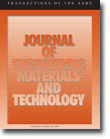
JOURNAL OF ENGINEERING MATERIALS AND TECHNOLOGY-TRANSACTIONS OF THE ASME
Shaping the future of materials science through rigorous research.JOURNAL OF ENGINEERING MATERIALS AND TECHNOLOGY-TRANSACTIONS OF THE ASME is a premier journal published by the American Society of Mechanical Engineers (ASME), dedicated to advancing the field of engineering materials and technology. With an ISSN of 0094-4289 and E-ISSN 1528-8889, this journal has provided invaluable insights since its inception in 1973. Operating from its headquarters in New York, United States, it serves a global audience of researchers, professionals, and students alike. The journal is recognized for its rigorous peer-review process and its commitment to disseminating high-quality research, currently holding a Q3 quartile ranking across multiple categories including Condensed Matter Physics, Materials Science, Mechanical Engineering, and Mechanics of Materials. With a focus on exploring innovative materials and their applications, it aims to foster collaboration and discovery in the engineering community. Although it is not an open-access journal, it continues to play a vital role in shaping the future of engineering materials research up to 2024. Researchers and practitioners will find in this journal a significant platform to support the development and understanding of engineering materials, making contributions that resonate through academia and industry.

AIMS Materials Science
Pioneering Open Access in Materials ScienceAIMS Materials Science is an esteemed open-access journal dedicated to advancing the field of materials science. Published by the American Institute of Mathematical Sciences (AIMS), this journal has been a vital resource for researchers, professionals, and students since its inception in 2014. With an ISSN of 2372-0468 and an E-ISSN of 2372-0484, it focuses on disseminating high-quality research in materials science, ranging from general materials science to cutting-edge advancements in innovative materials applications. Currently ranked Q3 in the 2023 Scopus Materials Science (miscellaneous) category, with a ranking of 253/463, AIMS Materials Science strives to provide an open forum for scholarly dialogue and collaboration, ensuring valuable insights are accessible to the global scientific community. The journal's commitment to open access enhances its visibility and reach, further promoting impactful research in this dynamic field.